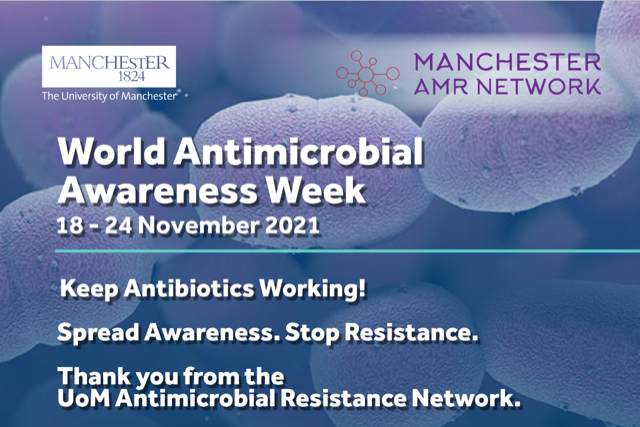To mark World Antibiotic Awareness Week 2021 The University of Manchester has a range of acitivies across the coming week:
22-26 November our Student AMR Society has organised a series of midday seminars: https://www.eventbrite.co.uk/e/world-antimicrobial-awareness-week-2021-lunchtime-webinars-tickets-203983569347
23 November our AMR Network has organised a webinar “Spread Awareness – Stop Resistance!” @4PM about the impact of antimicrobial resistance on patients: https://us02web.zoom.us/webinar/register/WN_mnYiyvT2RnGuYhnC3b-4Zw
All events are free-of-charge and open to everyone!
In this month’s blog Roger Harrison (Senior Lecturer in Public Health, Division of Population Health) explores why antimicrobial resistance poses such a serious challenge to our health and the role that education can play in combatting it.
Antimicrobial resistance (AMR) is a natural phenomenon, sped up by society’s prolific use of antibiotics, antivirals and antifungals. It is now well established that the increasing use of these drugs is causing people across the world to suffer with untreatable infections, and more of whom are dying. The United Nations World Assembly recently announced AMR as the biggest threat to global security, on a par with climate change. This year, the World Health Organization (WHO), Food and Agriculture Organization (FAO) of the United Nations and World Organization for Animal Health (OIE) adopted a Tripartite Agreement to respond to the challenges of containing and reducing the impact of AMR. The consequences of not responding to the AMR crisis are likely to be grave for people, non-human animals, aquaculture, the environment and plants. The World Bank estimates within twenty years, the cost to the global economy will be startling, at least $1 trillion per year, and leading to more people in poverty. Professor Dame Sally Davies, an Alumni of The University of Manchester, previous Chief Medical Officer for England, and now the UK Special Envoy on Antimicrobial Resistance, refers to AMR as ‘the silent pandemic’.
A glimmer of hope comes from the objectives set out in the WHO’s Global Action Plan, the first of which is to increase public and professional education and engagement on this subject. In 2015, two academics at The University of Manchester, Roger Harrison and David Allison, recognised the value in developing the university’s own programme, reflecting the WHO action plan, which they called ‘Action on Antimicrobial Resistance: One Student, One Campus, One World’. Since its launch, this programme has trained and supported more than 300 students to be Antibiotic Ambassadors. Their education and engagement activities have been varied, fun and informative, reaching out and conducting workshops in local schools, science festivals on the student campus, creating an online information resource for patients and the public, and running seminars for students, staff and publics. Often these activities coincided with World Antibiotic Awareness Week, linked with the WHO. Furthermore, other approaches have been used to help reach different communities. Examples include the university’s first public podcast broadcast, and a livestreamed seminar aimed at high school children across the country. The latter ran in partnership with the university’s ‘Live with Scientists’, aiming to make science education more accessible, and supported by the national charity Antibiotic Research UK (https://www.antibioticresearch.org.uk)
UoM has a long-standing reputation of supporting and developing education and research in different countries, particularly low-income countries, and this links directly to the UN’s Sustainable Development Goals. In recognition of this, Roger Harrison has established and continues to support similar areas of work, to meet the aspirations of the Global Action Plan on Antimicrobial Resistance. He worked with students at the University of Rwanda to run similar school-level workshops in rural parts of the country, and in Kenya, he is leading the development of a new online ‘escape room’ game to enhance the undergraduate curriculum on AMR. Additional work in northern and eastern Uganda has included professional education to maximise the appropriate use of antibiotics in the hospitals, and student events at the large town markets to raise awareness amongst the public. Of course, the need to evaluate and ensure the impact of these different approaches is critical, and a number of research-related projects have been funded and led in partnership in Uganda and Tanzania.
Collectively, UoM, with staff and student partnerships, has, and continues to make a direct contribution to the aspirations of the WHOs Global Action Plan on Antimicrobial Resistance. Of course, this is just one small part of reducing the impact of AMR in all aspects of the world. Nevertheless, high attendance rates, requests for repeated events, and positive feedback, show that students and public alike, value our approach.

